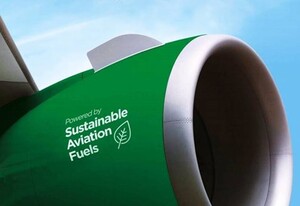
Since 2022, France has required a 1% blend of Sustainable Aviation Fuel (SAF) in aviation fuel, a move that has led Air France-KLM to impose an additional charge of up to 12 euros since January 2022 to cover the costs associated with SAF introduction.
According to the aviation industry on June 28, a, France remains the only country in the EU with such a mandate. However, this is set to change as the European Union (EU) plans to mandate the use of SAF for flights refueling at airports within member states starting next year, raising concerns in the aviation industry about the increased burden of decarbonization.
SAF, which can reduce carbon emissions by up to 80% compared to fossil fuel-based aviation fuel, is significantly more expensive, costing 3 to 5 times more than conventional aviation fuel. This cost disparity has already impacted airlines operating routes to France. For instance, Asiana Airlines, which operates the Incheon-Paris route six times a week, incurred additional costs of around 700 million KRW last year due to SAF usage.
The issue is set to escalate as the SAF mandate will expand to all 27 EU member states starting next year. According to a report disclosed by Korean Air to the Carbon Disclosure Project, the company is expected to incur costs ranging from a minimum of 11.4 billion won (approximately $8.4 million) to a maximum of 22.9 billion won due to the SAF mandate starting next year. Asiana Airlines plans to increase its routes to and from EU member cities to 24 times a week starting in September. With the number of routes requiring SAF quadrupling and the blending ratio increasing to 2%, next year’s SAF-related costs will be significantly higher than last year.
The European Commission’s “ReFuelEU” proposal stipulates that from 2025, all airports within the 27 EU member states must blend 2% SAF into aviation fuel. The blending ratio will increase to 6% by 2030, 20% by 2035, and 70% by 2050. Airlines not using SAF will be fined at least twice the annual average price of the aviation fuel for the non-compliant portion. According to Woori Finance Research Institute, the additional costs from the mandatory use of SAF on flights departing from the EU will reduce airlines’ operating profit margins by 0.3 percentage points in 2025 and up to 10 percentage points by 2050 when the mandatory use ratio increases to 70%.
Lufthansa plans to impose an additional charge of at least 1 euro to a maximum of 72 euros on all flights departing from EU member states, the UK, Norway, and Switzerland starting January 1 next year. This move mirrors the approach taken by Air France-KLM, which has been imposing an additional charge of up to 12 euros since January 2022 to cover the costs associated with SAF introduction.
The introduction of eco-friendly aircraft utilizing SAF is also necessary, requiring large-scale investments in the mid to long term. Airbus and Boeing are currently researching and developing aircraft that use 100% SAF. However, the introduction of such eco-friendly aircraft is costly due to the need for lightweighting for fuel efficiency and the high demand from airlines worldwide, leading to a premium in the manufacturing process.

